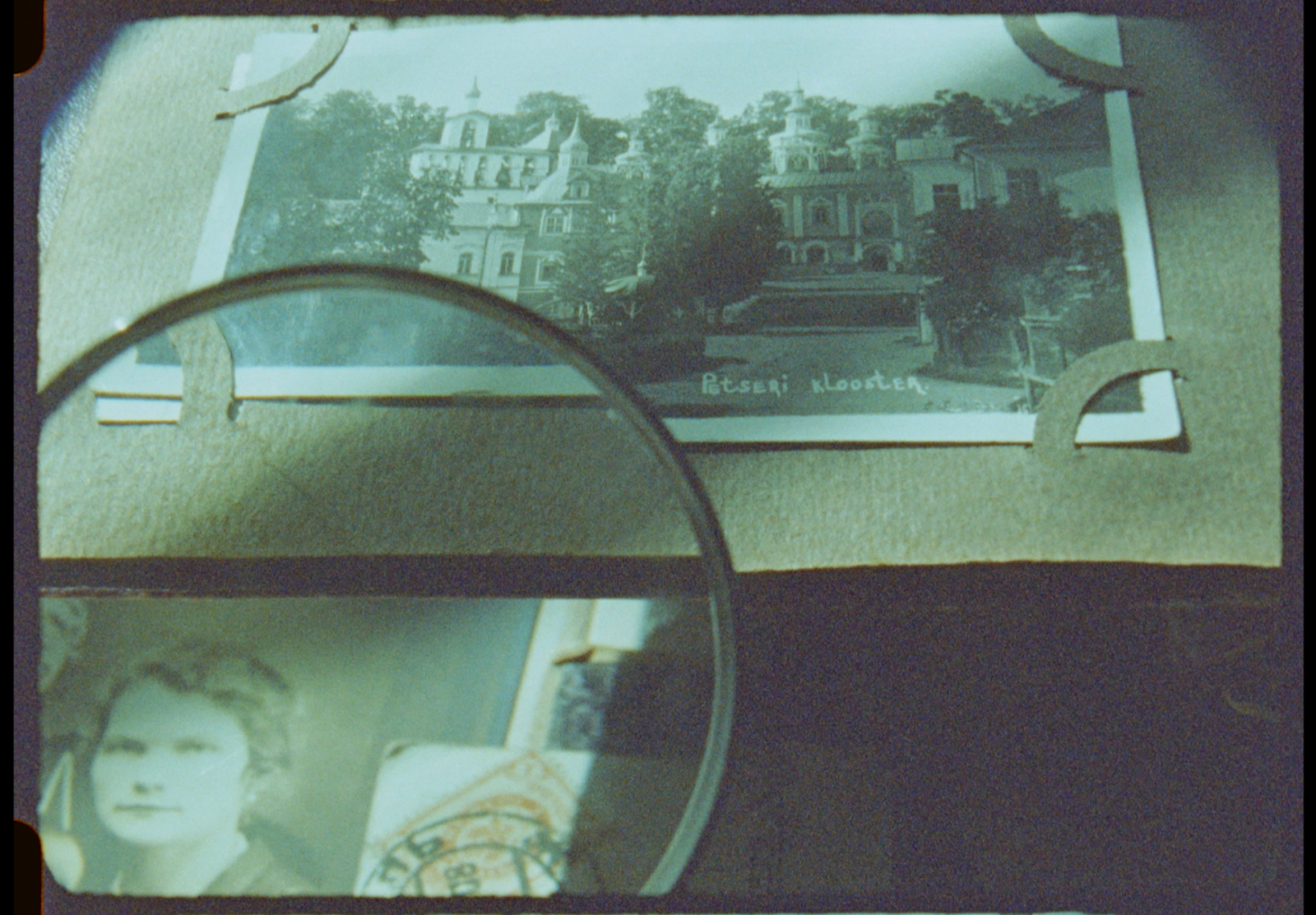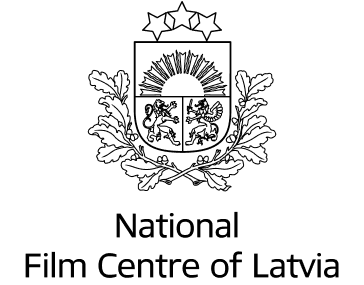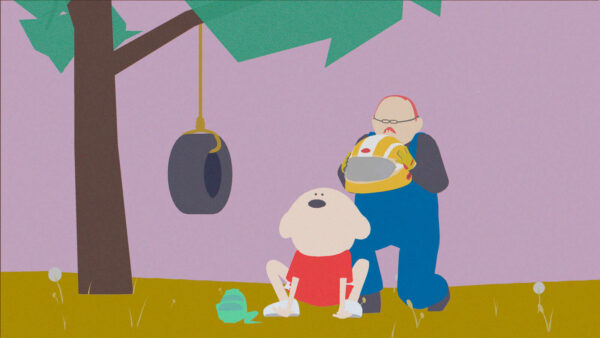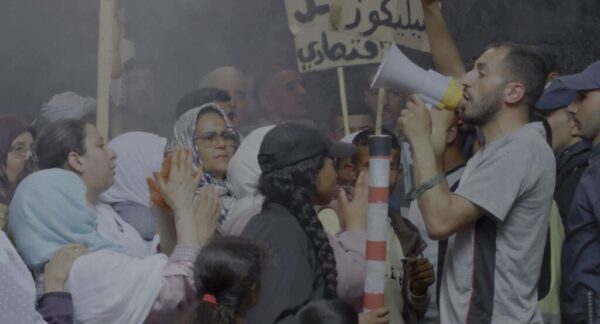Recall, Restore, Sew It Together
Sewing Machine
The history of a town and its people, exquisitely told through the life story of the filmmaker’s great-grandmother.

The thread of Ülo Pikkov’s Sewing Machine (2024), a melancholy interweaving of archival footage and animation, takes time to unravel. At first glance, the story is quite straightforward: the film is an ode to Pechory, “an ancient city on the border between Estonia and Russia”. We learn that Pechory emerged and developed around an Orthodox monastery, founded in the 15th century, and used to, together with the county by the same name, belong to the first Estonian Republic from 1920 to 1944, until Estonia was occupied by the Soviet Union. After the collapse of the USSR, Estonia tried to reclaim the territory, but without success.
As the story unfolds, what began as a political statement gradually transforms into a deeply personal narrative. Pikkov’s vanavanaema, great-grandmother in Estonian, as poetically and rhythmically repeated through the film, was a devoted Orthodox Christian. She fled Pechory because it had become the frontier of WWI and tried to find consolation in Kyiv, the ancient centre of Orthodoxy. After being chased back to Estonia by the war, her relationship to her native place in Pechory and religious homeland in Ukraine becomes the red thread for Sewing Machine. Mari Kalkun’s “It’s been awhile since I…”, the haunting melody hummed throughout the film, was originally composed for the theatre performance Longing for Pechory (Ilmar Vananurme & Urmas Lennuk, 2021). But while the performance dealt with newly established borders tearing lovers apart, this film addresses the personal relationship people have with land.
During her stay in Kyiv, the great-grandmother had already met and lost her husband, but, more importantly, had a baby daughter, whom she smuggled back to Estonia in the case of a sewing machine. It is precisely this dual (be)longing that roots Pikkov both in Pechory and Kyiv. According to the director, the starting point of the film were the images of refugees fleeing Ukraine after the full scale invasion of Russia in 2022. Feeling strongly for Ukrainians and their fight, the director warns: “We should remember that evil is always there very close to us. Seeing the trains full of women and children fleeing to neighbouring countries, I sensed a familiarity: It was my great-grandmother, fleeing Ukraine a hundred years ago, hiding her baby.”
Ülo Pikkov’s creative career spans award-winning animated films, fiction books for both children and adults, and scholarly work in film theory. These diverse experiences converge in a richly layered directorial vision that reflects both depth and versatility. As such, the film is supported by a mix of personal and public archival materials and a touch of magical realism, brought to life through various film techniques—such as shaky camera work, purposefully damaged film, and stop-motion animation, created in collaboration with Anu-Laura Tuttelberg (Winter in the Rainforest (2019), On Weary Wing Go By (2024)). As Pikkov comments: “It is an homage to film as a material. I played with the idea of memories—some memories are remembered vividly and some are just brief moments. With drawn animation, everything is created from scratch and in this way, I could include real objects that belonged to my great-grandmother.” This is true in both a literal and metaphorical sense. For instance, Pikkov references his great-grandmother by filming the few portraits he has of her nestled between the leaves of willowherb—a plant traditionally used for the tea she used to drink in her youth, but also one that is known for its resilience, thriving even in ruins and rubble.
Objects also mimic one another in this short documentary—a key artistic decision in the film. The particular rattle of the sewing machine is very similar to the one that an old-fashioned film camera makes while it is shooting and its film is rolling. Pikkov boldly leaps into this similarity, letting the viewer’s imagination move freely in between the associations. In the opening scene of the film, the narrator (Pikkov himself) promises a story about a bright star. As the handheld camera gazes a small hole from inside the machine’s case, bright sunlight fills the entire screen. The bright, bright star. We can only wonder if this exact image was anyhow similar to what the baby was seeing while traveling. But for any cinephile, it can also mean something much more. Rays of light passing through a small hole into a dark space form an inverted image—a natural phenomenon called camera obscura, the precursor of photography and film. The shot of the sunbeam through a pinhole captures both the essence of the birth of the cinema, as well as a promise of Pikkov’s own existence seen through his grandmother’s eyes—then a baby.
The story that traces the journey of Pikkov’s great-grandmother takes an unexpected turn at the final third of the film. As we come to understand that her dream of returning to Pechory is destined to remain unfulfilled, Pikkov also resists a conventional ending. Instead, he continues to weave together the history of cinema and his family’s story. In a surprising twist, the missing sewing machine reappears—not in reality, but within the iconic silent film Man with a Movie Camera (1929), directed by Ukrainian pioneer Dziga Vertov. This rediscovery of the sewing machine is, of course, an act of imagination. The missing pieces of the story can be easily rebuilt and re-imagined through the medium of film, and Pikkov does so in a playful manner with a lot of care and love for his own family and craft. His creative approach underscores the power of cinema to bridge gaps left by time, loss, and the brutal aftermath of war. In this way, storytelling becomes an act of restoration.
This text was developed during the Emerging Critics’ Workshop 2025, organised by the Riga International Short Film Festival 2ANNAS, with the financial support of the Latvian National Film Centre, and tutored by Michiel Philippaerts.







There are no comments yet, be the first!